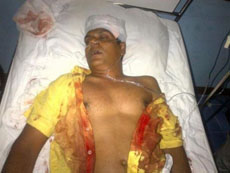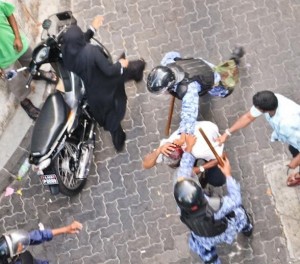The disciplinary board of the Maldives Police Service (MPS) has decided not to take any administrative action against five officers facing criminal prosecution over police brutality in February 2012, Assistant Commissioner of Police Ali Rasheed revealed at a press briefing yesterday (June 18).
Earlier this month, the Police Integrity Commission (PIC) concluded investigations into allegations of police brutality against demonstrators of the Maldivian Democratic Party (MDP) on February 8, 2012, submitting six cases for prosecution.
The PIC also made a recommendation to the home ministry to take administrative action against the six police officers accused of brutality.
The Home Ministry forwarded the cases to the police disciplinary board, Assistant Commissioner Rasheed explained at yesterday’s press briefing.
“The disciplinary board has reviewed the cases and made decisions concerning the six police officers involved in these cases,” he said. “[The disciplinary board] has decided to dismiss one of those officers. On the remaining five cases, as the cases are currently at the court stage, the disciplinary board has decided not to take any administrative action against them until the court cases reach a definitive conclusion.”
A media official at the Prosecutor General’s Office (PGO) confirmed to Minivan News today that trials have begun on some cases of police brutality on February 8, while state prosecutors were in the process of interviewing witnesses in the other cases.
On February 8, 2012, thousands of MDP supporters took to the streets of Male’ in a protest march after former President Mohamed Nasheed declared that he resigned the previous day “under duress” in a “coup d’etat” instigated by mutinying police officers of the Special Operations (SO) command.
Following an investigation into the violence on February 8, the Human Rights Commission of Maldives (HRCM) concluded that the heavy-handed police crackdown on the MDP walk across Male’ was “brutal” and “without warning.”
The HRCM recommended investigations by the PIC into the “disproportionate” use of force that left dozens of demonstrators injured and hospitalised.
Moreover, the Commonwealth-backed Commission of National Inquiry (CoNI) – which controversially concluded that the transfer of presidential power on February 7 was constitutional – also recommended prompt investigations of police brutality.
“There were acts of police brutality on 6, 7 and 8 February 2012 that must be investigated and pursued further by the relevant authorities,” the report stated.
 In May 2013 – one year and four months after the incidents – the PGO pressed charges against two police officers accused of assaulting MDP MPs ‘Reeko’ Moosa Manik and Mariya Ahmed Didi during the violent crackdown on February 8.
In May 2013 – one year and four months after the incidents – the PGO pressed charges against two police officers accused of assaulting MDP MPs ‘Reeko’ Moosa Manik and Mariya Ahmed Didi during the violent crackdown on February 8.
MDP Chairperson ‘Reeko’ Moosa was flown overseas for treatment of severe injuries sustained during the assault. The two MPs were dragged out by SO officers while they were hiding in a shop with former President Nasheed.
Nasheed was briefly taken under police custody before being released back into the crowd.
Videos also emerged on social media appearing to show SO officers brutally beating MDP MP Ibrahim Rasheed ‘Bonda.’
Impunity
According to a status update by the PIC on June 6, the commission investigated 29 cases of police brutality before forwarding six cases for prosecution.
PIC Vice Chair Haala Hameed told parliament’s Government Oversight Committee on June 4 that the commission had urged then-Home Minister Mohamed Jameel to suspend the accused officers immediately.
However, Hameed said that the request was not adhered to and at least one of the accused officers was promoted.
Hameed said the commission had failed to identify the police officers in five of the remaining cases while 11 other cases lacked supporting evidence.
“These are not disciplinary issues, but crimes. Aside from sending cases to the Prosecutor General, we also recommended the Home Minister suspend these officers, because of the delays in prosecution. We believe these officers should not be serving in the police,” Hameed said.
Former PIC Chair Shahinda Ismail – who resigned citing failure to hold police accountable for human rights violations – explained to Minivan News in September 2012 that article 44 of the Police Act allows the home minister to ignore PIC recommendations if the commission is informed in writing.
Shahinda referred to a case involving Staff Sergeant Ali Ahmed, who was caught on tape kicking a demonstrator while he was on the ground.
The case was sent for prosecution while the PIC recommended administrative action against the staff sergeant to the Home Minister.
“I know for a fact he is still a policeman and was promoted after this incident,” Shahinda said at the time.
“It is really upsetting – a huge concern – for me that the police leadership is showing a trend where unlawful officers are acting with impunity. This can only lead to further violence,” she added.
Meanwhile, in May this year, the MDP accused the government of fast-tracking 117 “politically-motivated” cases involving its supporters charged with terrorism and obstruction of police duty.
“Why doesn’t the government take action against those police officers when there is clear evidence of police brutality? None of the police officers have been investigated or prosecuted in line with the CoNI,” said MDP MP Imthiyaz Fahmy, who was himself arrested on February 8.
February 8 crackdown
While riot police and soldiers baton-charged the front line of protestors on February 8, Minivan News observed SO officers charging the crowd from a narrow alley leading to the Maldives Monetary Authority (MMA) area.
The SO police officers used obscene language, pointed to and chased after individual MDP activists and severely beat unarmed civilians.
Al Jazeera news filmed parts of the attack from the rear and reported that on February 8 “police and military charged, beating demonstrators as they ran – women, the elderly, [with] dozens left nursing their wounds.”
According to the HRCM report, 32 people filed complaints with the commission concerning varying degrees of injuries sustained in the crackdown, while 20 people submitted medical documents of their treatment of injuries.
Among the injuries caused by the police baton charge, the HRCM report noted that several people were bruised and battered, one person fractured a bone in his leg, one person was left with a broken arm and six people sustained head wounds.
Two fingers on the left hand of one demonstrator were crushed, the report noted, and the victim had to undergo treatment at the operating theatre.
Moreover, the HRCM report into the events of February 6 and 7 revealed that 43 people were treated for injuries at the Indira Gandhi Memorial Hospital (IGMH), while 28 people were treated at the ADK private hospital.
On February 8, Minivan News also observed several youth with head injuries queuing up for x-rays in the waiting area outside the reception area of IGMH.
One young woman who went to IGMH with her sister was being treated for a head wound. The gauze wrapped around her head was spotted with blood, and she claimed the wound was still bleeding as she went in for an X-ray.
“The police were just standing there and suddenly we were being beaten with batons and pepper spray was thrown in our face. They threw us to the ground and kept beating us,” she said.
The BBC meanwhile reported “a baton charge by police on crowds gathered outside one of the main hospitals.”
“People scattered as officers sprinted towards them silhouetted against the lights of passing traffic,” the BBC’s Andrew North reported from Male’.
“Inside the hospital, dozens of Mr Nasheed’s supporters are still being treated for injuries, following earlier scuffles in the main square. Among them is Reeko Moosa Maniku, chairman of Mr Nasheed’s Maldives Democratic Party – who was with the former president when the clashes broke out. With a large head bandage and his shirt bloodied, he regained consciousness as we arrived. The police said they would kill me, he told us, as they beat me. Another MP was still unconscious in another ward.”
 (0)Dislikes
(0)Dislikes (0)
(0) While riot police baton-charged the front line of protesters on February 8, Minivan News observed riot police also charging the crowd from a narrow alley leading to the Maldives Monetary Authority (MMA) area.
While riot police baton-charged the front line of protesters on February 8, Minivan News observed riot police also charging the crowd from a narrow alley leading to the Maldives Monetary Authority (MMA) area.